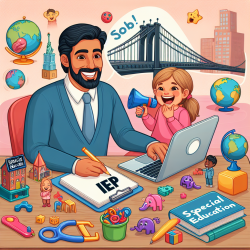As a Special Education Director, ensuring that students receive the necessary support services is paramount. Understanding the eligibility and dismissal criteria for speech-language services is essential for maintaining compliance and providing effective interventions. Let's delve into the key points around these criteria as outlined by ASHA and IDEA 2004.
Eligibility and Dismissal Criteria: An Overview
Does ASHA have recommended eligibility and dismissal criteria for educational settings?ASHA does not recommend specific criteria for eligibility or dismissal of services in educational settings. Instead, these criteria are determined by federal, state, and local guidelines. For additional information, see ASHA's resources on Eligibility and Dismissal Criteria and Cognitive Referencing.
Determining Eligibility Under IDEA 2004
IDEA 2004 outlines a comprehensive process for determining eligibility and educational need for special education and related services. Each public agency must:
- Draw upon information from various sources, including aptitude and achievement tests, parent input, and teacher recommendations.
- Consider information about the child’s physical condition, social or cultural background, and adaptive behavior.
- Ensure that all obtained information is documented and carefully considered.
Discrepancy Model and Eligibility
Does IDEA support the use of a discrepancy model to determine eligibility?The regulations specify that criteria for determination are conducted at the state level and:
- Must not require the use of a severe discrepancy between intellectual ability and achievement for determining whether a child has a specific learning disability.
- Must permit the use of a process based on the child’s response to scientific, research-based intervention.
- May permit the use of other alternative research-based procedures for determining whether a child has a specific learning disability.
Additionally, a public agency must use the state criteria adopted pursuant to the information presented above in determining whether a child has a specific learning disability.
Cognitive Referencing and Speech-Language Services
Are children who have commensurate IQ and language scores eligible for speech-language services?Cognitive referencing, which compares IQ and language scores as a factor for eligibility, is based on the assumption that language functioning cannot surpass cognitive levels. However, research has shown that the relationship between language and cognition is complex, and cognitive prerequisites are neither sufficient nor necessary for language to emerge. Therefore, ASHA does not support the use of cognitive referencing. For additional information, see ASHA's Cognitive Referencing resource.
Impact of Speech-Language Disorders on Educational Performance
Can a school district deny speech-language pathology services to a student with a "mild" articulation disorder if the district decides that the disability does not "adversely affect educational performance"?State and local school education agencies may have different interpretations of the phrase "adversely affects educational performance." However, they cannot deny IDEA-mandated services to a child with a speech or language impairment simply because the child does not have a discrepancy in age/grade performance in an academic subject-matter area. If communication skills are part of the school's academic standards and curriculum, then a child with a speech or language impairment has a disorder that adversely affects educational performance. Sound production errors can affect a student's ability to hear, speak, read, or write phonemes, impacting both academic and social performance. For more information, see ASHA's Eligibility and Dismissal resource.For more information, please follow this
link.










